- Home
- Joseph Conrad
Heart of Darkness and the Congo Diary Page 7
Heart of Darkness and the Congo Diary Read online
Page 7
“We gave her her letters (I heard the men in that lonely ship were dying of fever at the rate of three a day) and went on. We called at some more places with farcical names, where the merry dance of death and trade goes on in a still and earthy atmosphere as of an overheated catacomb; all along the formless coast bordered by dangerous surf, as if Nature herself had tried to ward off intruders; in and out of rivers, streams of death in life, whose banks were rotting into mud, whose waters, thickening into slime, invaded the contorted mangroves, that seemed to writhe at us in the extremity of an impotent despair. Nowhere did we stop long enough to get a particularised impression, but the general sense of vague and oppressive wonder grew upon me. It was like a weary pilgrimage amongst hints for nightmares.
“It was upwards of thirty days before I saw the mouth of the big river. We anchored off the seat of the government.40i4i5 But my work would not begin till some two hundred miles further on. So as soon as I could I made a start for a place thirty miles higher up.
“I had my passage on a little sea-going steamer. Her captain was a Swede, and knowing me for a seaman, invited me on the bridge. He was a young man, lean, fair, and morose, with lanky hair and a shuffling gait. As we left the miserable little wharf, he tossed his head contemptuously at the shore. ‘Been living there?’ he asked. I said, ‘Yes.’ ‘Fine lot these government chaps—are they not?’ he went on, speaking English with great precision and considerable bitterness. ‘It is funny what some people will do for a few francs a month. I wonder what becomes of that kind when it goes up country?’ I told him I expected to see that soon. ‘So-o-o!’ he exclaimed. He shuffled athwart, keeping one eye ahead vigilantly. ‘Don’t be too sure,’ he continued. ‘The other day I took up a man who hanged himself on the road. He was a Swede, too.’ ‘Hanged himself! Why, in God’s name?’ I cried. He kept on looking out watchfully. ‘Who knows? The sun too much for him, or the country perhaps.’
“At last we opened a reach. A rocky cliff appeared, mounds of turned-up earth by the shore, houses on a hill, others, with iron roofs, amongst a waste of excavations, or hanging to the declivity. A continuous noise of rapids above hovered over this scene of inhabited devastation. A lot of people, mostly black and naked, moved about like ants. A jetty projected into the river. A blinding sunlight drowned all this at times in a sudden recrudescence of glare. ‘There’s your Company’s station,’41 said the Swede, pointing to three wooden barrack-like structures hanging on the rocky slope. ‘I will send your things up. Four boxes did you say? So. Farewell.’
“I came upon a boiler wallowing in the grass, then found a path leading up the hill. It turned aside for the boulders, and also for an undersized railway-truck lying there on its back with its wheels in the air. One was off. The thing looked as dead as the carcass of some animal. I came upon more pieces of decaying machinery, a stack of rusty rails. To the left a clump of trees made a thick shade, where dark things seemed to stir feebly. I blinked, the path was steep. A horn tooted to the right, and I saw the black people run. A heavy and dull detonation shook the ground, a puff of smoke came out of the cliff, and that was all. No change appeared on the face of the rock. They were building a railway.42 The cliff was not in the way of anything; but this objectless blasting was all the work going on.
“A slight clinking behind me made me turn my head. Six black men advanced in a file, toiling up the path. They walked erect and slow, balancing small baskets full of earth on their heads, and the clink kept time with their footsteps. Black rags were wound round their loins, and the short ends behind wagged to and fro like tailse15. I could see every rib, the joints of their limbs were like knots in a rope; each had an iron collar on his neck, and all were connected together with a chain whose bights swung between them, rhythmically clinking. Another report from the cliff made me think suddenly of that ship of war I had seen firing into a continent. It was the same kind of ominous voice; but these men could by no stretch of imagination be called enemies. They were called criminals, and the outraged law, like the bursting shells, had come to them, an insoluble mystery from over the sea. All the meagre breasts panted together, the violently dilated nostrils quivered, the eyes stared stonily up-hill. They passed me within six inches, without a glance, with that complete, deathlike indifference of unhappy savages.e16 Behind this raw matter one of the reclaimed, the product of the new forces at work, strolled despondently, carrying a rifle by its middle. He had a uniform jacket with one button off, and seeing a white man on the path, hoisted his weapon on to his shoulder with alacrity. This was simple prudence, white men being so much alike at a distance that he could not tell who I might be. He was speedily reassured, and with a large, white, rascally grin, and a glance at his charge, seemed to take me into partnership in his exalted trust. After all, I also was a part of the great cause of these high and just proceedings.
“Instead of going up, I turned and descended to the left. My idea was to let that chain-gang get out of sight before I climbed the hill. You know I am not particularly tender; I’ve had to strike and to fend off. I’ve had to resist and to attack sometimes—that’s only one way of resisting—without counting the exact cost, according to the demands of such sort of life as I had blundered into. I’ve seen the devil of violence, and the devil of greed, and the devil of hot desire; but, by all the stars! these were strong, lusty, red-eyed devils, that swayed and drove men—men, I tell you. But as I stood on this hillside, I foresaw that in the blinding sunshine of that land I would become acquainted with a flabby, pretending, weak-eyed devil of a rapacious and pitiless folly. How insidious he could be, too, I was only to find out several months later and a thousand miles further. For a moment I stood appalled, as though by a warning. Finally I descended the hill, obliquely, towards the trees I had seen.
“I avoided a vast, artificial hole somebody had been digging on the slope, the purpose of which I found it impossible to divine. It wasn’t a quarry or a sandpit, anyhow. It was just a hole. It might have been connected with the philanthropic desire of giving the criminals something to do. I don’t know. Then I nearly fell into a very narrow ravine, almost no more than a scar in the hillside. I discovered that a lot of imported drainage-pipes for the settlement had been tumbled in there. There wasn’t one that was not broken. It was a wanton smash-up. At last I got under the trees. My purpose was to stroll into the shade for a moment; but no sooner within than it seemed to me I had stepped into the gloomy circle of some Inferno.43 The rapids were near, and an uninterrupted, uniform, headlong, rushing noise filled the mournful stillness of the grove, where not a breath stirred, not a leaf moved, with a mysterious sound—as though the tearing pace of the launched earth had suddenly become audible.
“Black shapes crouched, lay, sat between the trees, leaning against the trunks, clinging to the earth, half coming out, half effaced within the dim light, in all the attitudes of pain, abandonment, and despair. Another mine on the cliff went off, followed by a slight shudder of the soil under my feet. The work was going on. The work! And this was the place where some of the helpers had withdrawn to die.
“They were dying slowly—it was very clear. They were not enemies, they were not criminals, they were nothing earthly now—nothing but black shadows of disease and starvation, lying confusedly in the greenish gloom. Brought from all the recesses of the coast in all the legality of time contracts,44 lost in uncongenial surroundings, fed on unfamiliar food, they sickened, became inefficient, and were then allowed to crawl away and rest. These moribund shapes were free as air—and nearly as thin. I began to distinguish the gleam of eyes under the trees. Then, glancing down, I saw a face near my hand. The black bones reclined at full length with one shoulder against the tree, and slowly the eyelids rose and the sunken eyes looked up at me, enormous and vacant, a kind of blind, white flicker in the depths of the orbs, which died out slowly. The man seemed young—almost a boy—but you know with them it’s hard to tell. I found nothing else to do but to offer him one of my good Swede’s ship’s biscu
its I had in my pocket. The fingers closed slowly on it and held—there was no other movement and no other glance. He had tied a bit of white worsted round his neck—Why? Where did he get it? Was it a badge—an ornament—a charm—a propitiatory act? Was there any idea at all connected with it? It looked startling round his black neck, this bit of white thread from beyond the seas.
“Near the same tree two more, bundles of acute angles, sat with their legs drawn up. One, with his chin propped on his knees, stared at nothing, in an intolerable and appalling manner: his brother phantom rested its forehead, as if overcome with a great weariness; and all about others were scattered in every pose of contorted collapse, as in some picture of a massacre or a pestilence. While I stood horror-struck, one of these creatures rose to his hands and knees, and went off on all-fours towards the river to drink. He lapped out of his hand, then sat up in the sunlight, crossing his shins in front of him, and after a time let his woolly head fall on his breastbone.
“I didn’t want any more loitering in the shade, and I made haste towards the station. When near the buildings I met a white man, in such an unexpected elegance of get-up that in the first moment I took him for a sort of vision. I saw a high starched collar, white cuffs, a light alpaca jacket, snowy trousers, a clear silk necktie,45 and varnished boots. No hat. Hair parted, brushed, oiled, under a green-lined parasol held in a big white hand. He was amazing, and had a penholder behind his ear.
“I shook hands with this miracle, and I learned he was the Company’s chief accountant, and that all the book-keeping was done at this station. He had come out for a moment, he said, ‘to get a breath of fresh air.’ The expression sounded wonderfully odd, with its suggestion of sedentary desk-life. I wouldn’t have mentioned the fellow to you at all, only it was from his lips that I first heard the name of the man who is so indissolubly connected with the memories of that time. Moreover, I respected the fellow. Yes; I respected his collars, his vast cuffs, his brushed head. His appearance was certainly that of a hair-dresser’s dummy; but in the great demoralisation of the land he kept up his appearance. That’s backbone! His starched collars and got-up shirt-fronts were achievements of character. He had been out nearly three years; and, later on, I could not help asking him how he managed to sport such linen. He had just the faintest blush, and said modestly, ‘I’ve been teaching one of the native women about the station. It was difficult. She had a distaste for the work.’ Thus this man had, verily, accomplished something. And he was devoted to his books, which were in apple-pie order.
“Everything else in the station was in a muddle—heads, things, buildings. Caravans,46 strings of dusty niggers with splay feet arrived and departed; a stream of manufactured goods, rubbishy cottons, beads, and brass wire47 set off into the depths of darkness, and in return came a precious trickle of ivory.
“I had to wait in this station for ten days—an eternity. I lived in a tent in the yard, but to be out of the chaos I would sometimes get into the accountant’s office. It was built of horizontal planks, and so badly put together that, as he bent over his high desk, he was barred from neck to heels with narrow strips of sunlight. There was no need to open the big shutter to see. It was hot there too; big flies buzzed fiendishly, and did not sting, but stabbed. I sat generally on the floor, while, of faultless appearance (and even slightly scented), perching on a high stool, he wrote, he wrote. Sometimes he stood up for exercise. When a truckle-bed48 with a sick man (some invalided ‘agent’ from up country) was hurriedly put in there, he exhibited a gentle annoyance. ‘The groans of this sick person,’ he said, ‘distract my attention. And without that it is extremely difficult to guard against clerical errors in this climate.’
“One day he remarked, without lifting his head, ‘In the interior you will no doubt meet Mr Kurtz.’49 On my asking who Mr Kurtz was, he said he was a first-class agent; and seeing my disappointment at this information, he added slowly, laying down his pen, ‘He is a very remarkable person.’ Further questions elicited from him that Mr Kurtz was at present in charge of a trading-post, a very important one, in the true ivory-country,50 at ‘the very bottom of there. Sends in as much ivory as all the others put together…’He began to write again. The sick man was too ill to groan. The flies buzzed in a great peace.
“Suddenly there was a growing murmur of voices and a great tramping of feet. A caravan had come in. A violent babble of uncouth sounds burst out on the other side of the planks. All the carriers were speaking together, and in the midst of the uproar the lamentable51 voice of the chief agent was heard ‘giving it up’ tearfully for the twentieth time that day…. He rose slowly. ‘What a frightful row,’ he said. He crossed the room gently to look at the sick man, and returning, said to me, ‘He does not hear.’ ‘What! Dead?’ I asked, startled. ‘No, not yet,’ he answered, with great composure. Then, alluding with a toss of the head to the tumult in the station-yard, ‘When one has got to make correct entries, one comes to hate these savages—hate them to the death!’ He remained thoughtful for a moment. ‘When you see Mr Kurtz,’ he went on, ‘tell him from me that everything here’—he glanced at the desk—‘is very satisfactory. I don’t like to write to him—with those messengers of ours you never know who may get hold of your letter—at that Central Station.’52 He stared at me for a moment with his mild, bulging eyes. ‘Oh, he will go far, very far,’ he began again. ‘He will be a somebody in the Administration before long. They, above—the Council in Europe, you know—mean him to be.’
“He turned to his work. The noise outside had ceased, and presently in going out I stopped at the door. In the steady buzz of flies the homeward-bound agent was lying flushed and insensible; the other, bent over his books, was making correct entries of perfectly correct transactions; and fifty feet below the doorstep I could see the still tree-tops of the grove of death.
“Next day I left that station at last, with a caravan of sixty men, for a two-hundred-mile tramp.53
“No use telling you much about that. Paths, paths, everywhere;i6i7 a stamped-in network of paths spreading over an empty land, through long grass, through burnt grass, through thickets, down and up chilly ravines, up and down stony hills ablaze with heat; and a solitude, a solitude, nobody, not a hut. The population had cleared out a long time ago. Well, if a lot of mysterious niggers armed with all kinds of fearful weapons suddenly took to travelling on the road between Deal54 and Gravesend, catching the yokels right and left to carry heavy loads for them, I fancy every farm and cottage thereabouts would get empty very soon. Only here the dwellings were gone too. Still I passed through several abandoned villages. There’s something pathetically childish in the ruins of grass walls. Day after day, with the stamp and shuffle of sixty pair of bare feet behind me, each pair under a sixty-pound load. Camp, cook, sleep, strike camp, march. Now and then a carrier dead in harness, at rest in the long grass near the path, with an empty water-gourd and his long staff lying by his side. A great silence around and above. Perhaps on some quiet night the tremor of far-off drums, sinking, swelling, a tremor vast, faint; a sound weird, appealing, suggestive, and wild—and perhaps with as profound a meaning as the sound of bells in a Christian country. Once a white man in an unbuttoned uniform, camping on the path with an armed escort of lank Zanzibaris,55 very hospitable and festive—not to say drunk. Was looking after the upkeep of the road, he declared. Can’t say I saw any road or any upkeep, unless the body of a middle-aged negro, with a bullet-hole in the forehead, upon which I absolutely stumbled three miles further on, may be considered as a permanent improvement. I had a white companion too, not a bad chap, but rather too fleshy and with the exasperating habit of fainting on the hot hillsides, miles away from the least bit of shade and water. Annoying, you know, to hold your own coat like a parasol over a man’s head while he is coming-to. I couldn’t help asking him once what he meant by coming there at all. ‘To make money, of course.e17 What do you think?’ he said, scornfully. Then he got fever, and had to be carried in a hammock slung under a pole. A
s he weighed sixteen stone I had no end of rows with the carriers. They jibbed, ran away, sneaked off with their loads in the night—quite a mutiny. So, one evening, I made a speech in English with gestures, not one of which was lost to the sixty pairs of eyes before me, and the next morning I started the hammock off in front all right. An hour afterwards I came upon the whole concern wrecked in a bush—man, hammock, groans, blankets, horrors. The heavy pole had skinned his poor nose. He was very anxious for me to kill somebody, but there wasn’t the shadow of a carrier near. I remembered the old doctor—‘It would be interesting for science to watch the mental changes of individuals, on the spot.’ I felt I was becoming scientifically interesting. However, all that is to no purpose. On the fifteenth day I came in sight of the big river again, and hobbled into the Central Station. It was on a back water surrounded by scrub and forest, with a pretty border of smelly mud on one side, and on the three others enclosed by a crazy fence of rushes. A neglected gap was all the gate it had, and the first glance at the place was enough to let you see the flabby devil was running that show. White men with long staves in their hands appeared languidly from amongst the buildings, strolling up to take a look at me, and then retired out of sight somewhere. One of them, a stout, excitable chap with black moustaches, informed me with great volubility and many digressions, as soon as I told him who I was, that my steamer was at the bottom of the river. I was thunderstruck. What, how, why? Oh, it was ‘all right.’ The ‘manager himself’ was there. All quite correct. ‘Everybody had behaved splendidly! splendidly!’—‘you must,’ he said in agitation, ‘go and see the general manager at once. He is waiting!’

 Heart of Darkness
Heart of Darkness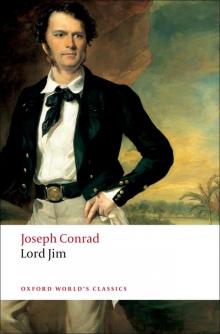 Lord Jim
Lord Jim The Nigger of the Narcissus (Echo Library)
The Nigger of the Narcissus (Echo Library) Victory (Dover Thrift Editions)
Victory (Dover Thrift Editions) Secret Agent
Secret Agent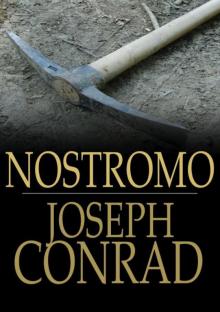 Nostromo
Nostromo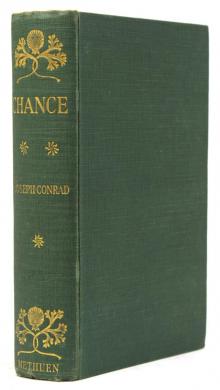 Chance: A Tale in Two Parts
Chance: A Tale in Two Parts Youth
Youth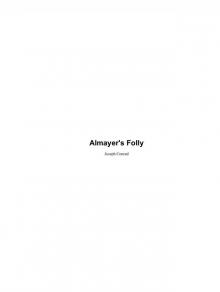 Almayer's Folly
Almayer's Folly The Heart of Darkness and the Secret Sharer
The Heart of Darkness and the Secret Sharer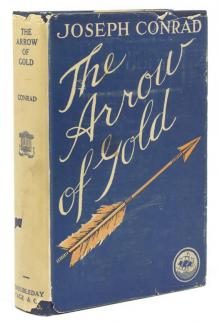 The Arrow of Gold: A Story Between Two Notes
The Arrow of Gold: A Story Between Two Notes The Rescue: A Romance of the Shallows
The Rescue: A Romance of the Shallows The Point Of Honor: A Military Tale
The Point Of Honor: A Military Tale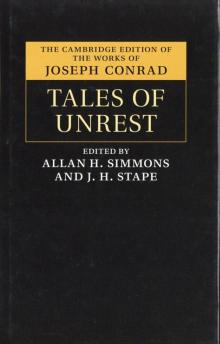 Tales of Unrest
Tales of Unrest Under Western Eyes
Under Western Eyes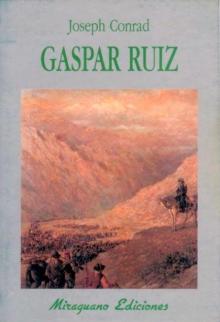 Gaspar Ruiz
Gaspar Ruiz A Set of Six
A Set of Six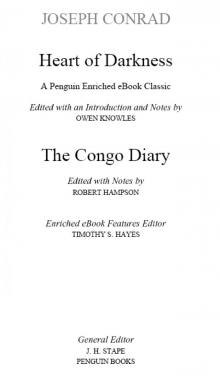 Heart of Darkness and the Congo Diary (Penguin Classics)
Heart of Darkness and the Congo Diary (Penguin Classics) Heart of Darkness and Selected Short Fiction
Heart of Darkness and Selected Short Fiction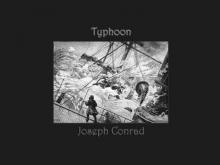 Typhoon
Typhoon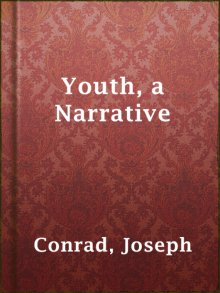 Youth, a Narrative
Youth, a Narrative Tomorrow
Tomorrow The Arrow of Gold
The Arrow of Gold The Shadow Line: A Confession
The Shadow Line: A Confession The Rescue
The Rescue Victory (Echo Library)
Victory (Echo Library) The Brute
The Brute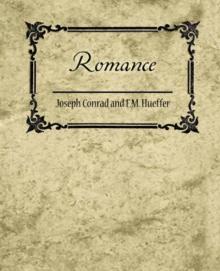 Romance
Romance A Personal Record
A Personal Record Lord Jim: A Tale
Lord Jim: A Tale Heart of Darkness and Selected Short Fiction (Barnes & Noble Classics Series)
Heart of Darkness and Selected Short Fiction (Barnes & Noble Classics Series) Within the Tides
Within the Tides The Secret Sharer and Other Stories
The Secret Sharer and Other Stories Falk
Falk Heart of Darkness and The Secret Sharer
Heart of Darkness and The Secret Sharer Chance
Chance An Anarchist
An Anarchist The Secret Agent: A Simple Tale
The Secret Agent: A Simple Tale The Secret Agent
The Secret Agent Complete Works of Joseph Conrad (Illustrated)
Complete Works of Joseph Conrad (Illustrated)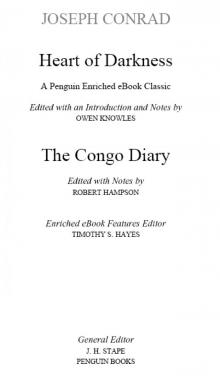 Heart of Darkness and the Congo Diary
Heart of Darkness and the Congo Diary Notes on Life & Letters
Notes on Life & Letters Typhoon (Single Story)
Typhoon (Single Story)